EXPOSED: How Americans Are Secretly Helping China Take Over U.S. Land
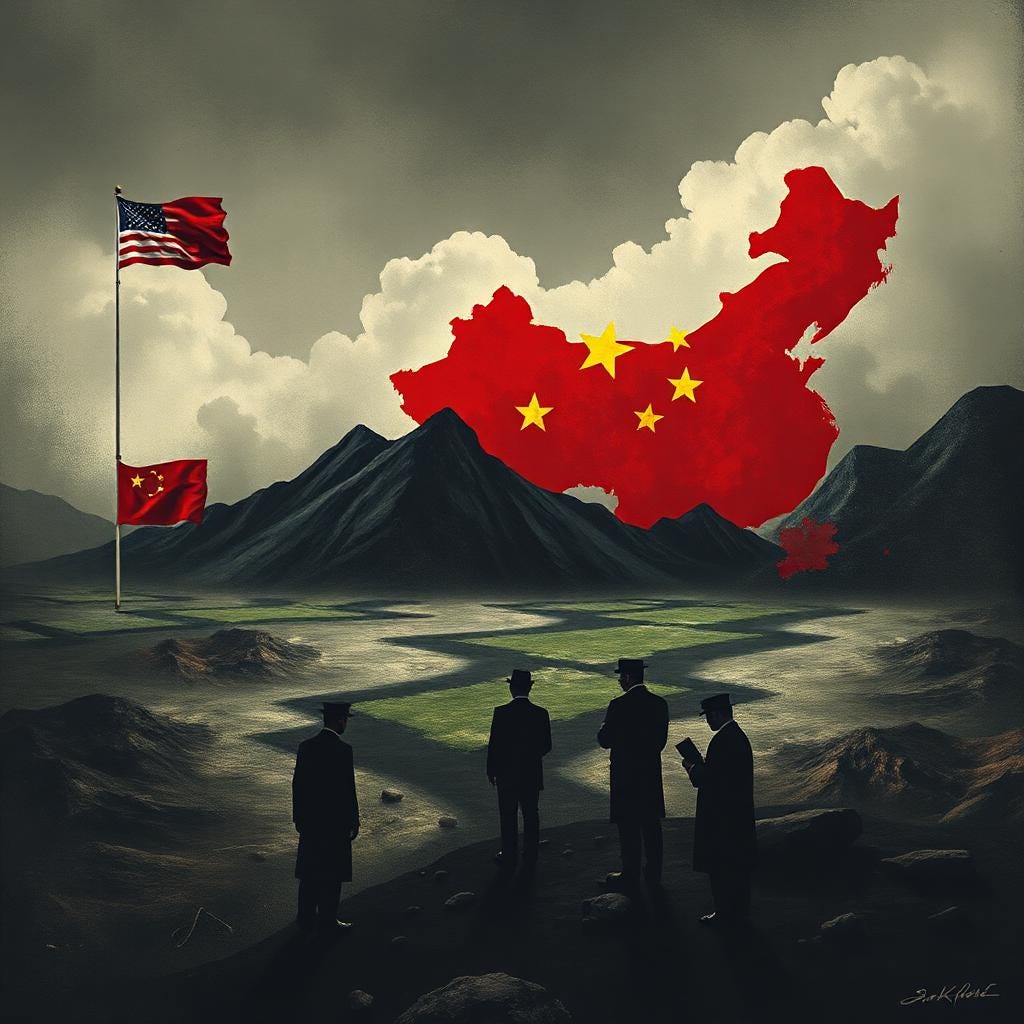
America’s farmland isn’t just being bought by Chinese investors. It’s being infiltrated by a silent network of U.S. officials, government programs, and youth initiatives that are unwittingly helping Beijing’s long-term strategic takeover.
They’re targeting local media outlets and American students while using Chinese propaganda-ridden pitch decks to convince state officials to forge closer relationships with the Chinese Communist Party.
Here’s how the game is played, and who’s helping China get away with it.
Meet the US China Heartland Association: The Patriot-Front for Beijing’s Land Grab
Think it’s just some regional nonprofit? Think again. The US China Heartland Association (USCHA) is a strategic front pushing “build bridges” and “mutual understanding” with Beijing. Their latest 2024 report is packed with language that sounds nice until you realize it’s code for “Let’s give China easy access to America’s farmland.”
What’s more alarming?
This group’s ties run deep into American politics. Several of their board members and advisors have served or are connected to former politicians, including Senator Mike Enzi and Congressman K. Michael Conaway, both of whom have publicly engaged with organizations promoting U.S.-China agricultural collaboration.
Joe Biden’s Ambassador to China Nick Burns even headlined some of their events during his tenure.
Among the Chinese Communist Party influence groups that collaborate with USHCA are the Chinese People’s Association for Friendship with Foreign Countries (CPAFFC) and China United States Exchange Foundation (CUSEF), both of which are part of Beijing’s United Front Work Department.
China’s United Front Work Department is a core part of the Chinese Communist Party’s influence machine. Official U.S. government sources describe the United Front as a propaganda apparatus with the goal of “advancing Beijing’s strategic influence and undermining American interests through united front tactics that promote China’s agenda globally.” The FBI and the State Department have both identified the United Front as a “tool for Chinese intelligence and influence activities,” tasked with “disrupting, influencing, and manipulating” perceptions both domestically and abroad.
In the U.S., this involves supporting groups that push for policies favorable to Beijing—precisely what USCHA is up to by softening the narrative around China’s land grabs and influence campaigns.
And it gets worse.
USCHA sponsors delegations that include mayors and local officials, waving the flag of “diplomacy” while essentially handing Beijing a VIP pass into America’s farm communities. This isn’t just soft diplomacy. It’s soft invasion, dressed up as “partnership.”
In 2019 and 2023 USHCA took the mayors on delegations to China to foster these close ties, including touring companies sanctioned by the U.S. government over their ties to China’s military.
Participants include: Jim Brainard (Carmel, IN), Tito Brown (Youngstown, OH), Rich Carr, (Maumee, OH), Paul TenHaken (Sioux Falls, SD), Barbara Buffaloe (Columbia, MI), Lee Harris (Shelby County, TN), Chokwe Lumumba (Jackson, MS), Kim Norton (Rochester, MN), and Mayor Robyn Tannehill (Oxford, MS.)
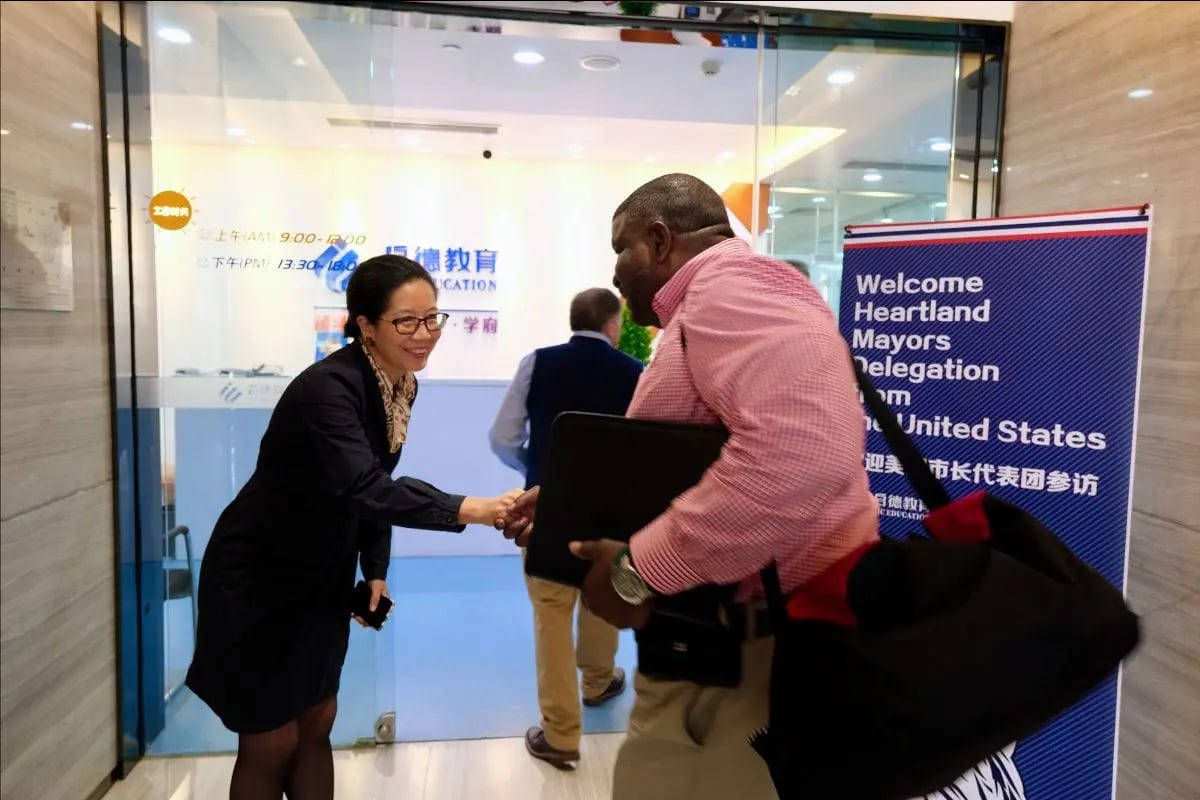 2019 Mayors Delegation
2019 Mayors Delegation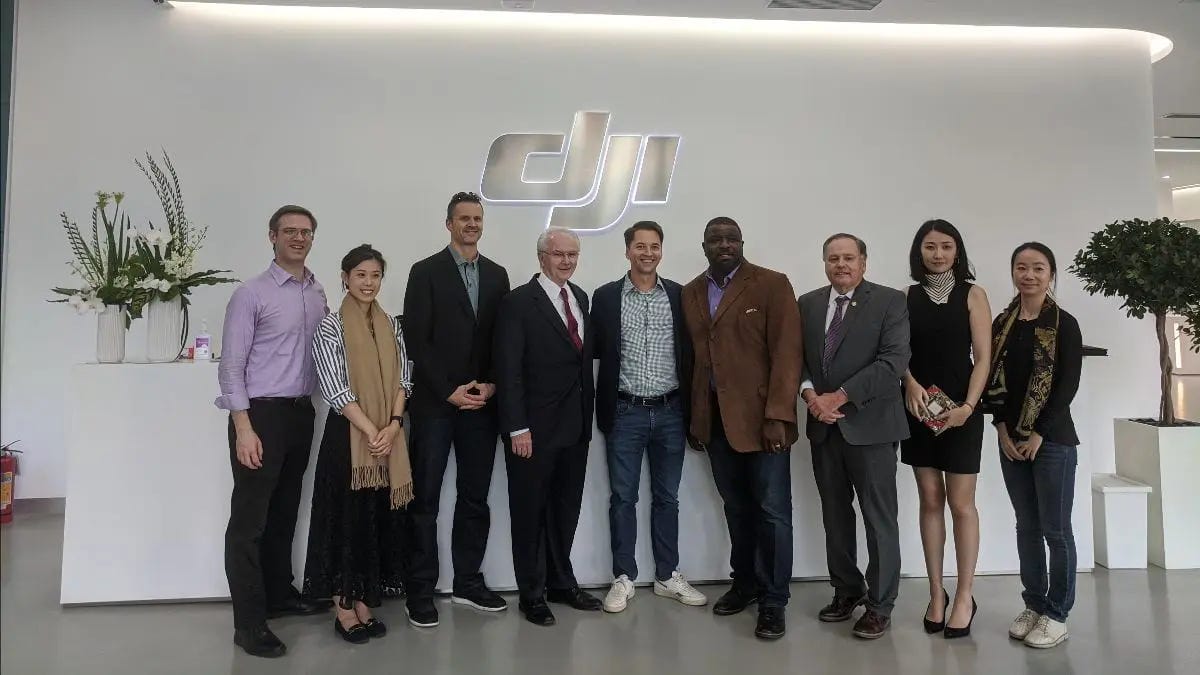 2019 Mayors delegation meeting with the sanctioned Chinese dronemaker DJI.
2019 Mayors delegation meeting with the sanctioned Chinese dronemaker DJI.The Youth Infiltration Machine: How America’s Kids Are Getting Groomed to Help China
The biggest Trojan horse? America’s children.
USCHA isn’t just talking land deals; they’re planting the seeds for future enablers. Their recent Future of Agriculture Leaders Delegation to China involved 15 students from 15 universities across the U.S. They flew them to places like Beijing, Xi’an, and Zhengzhou for a week of “cultural exchange” (code for brainwash.)
These students visited farms, tech parks, and government offices. They met officials, ate dumplings, and soaked up the narrative that China and America are best friends forever.
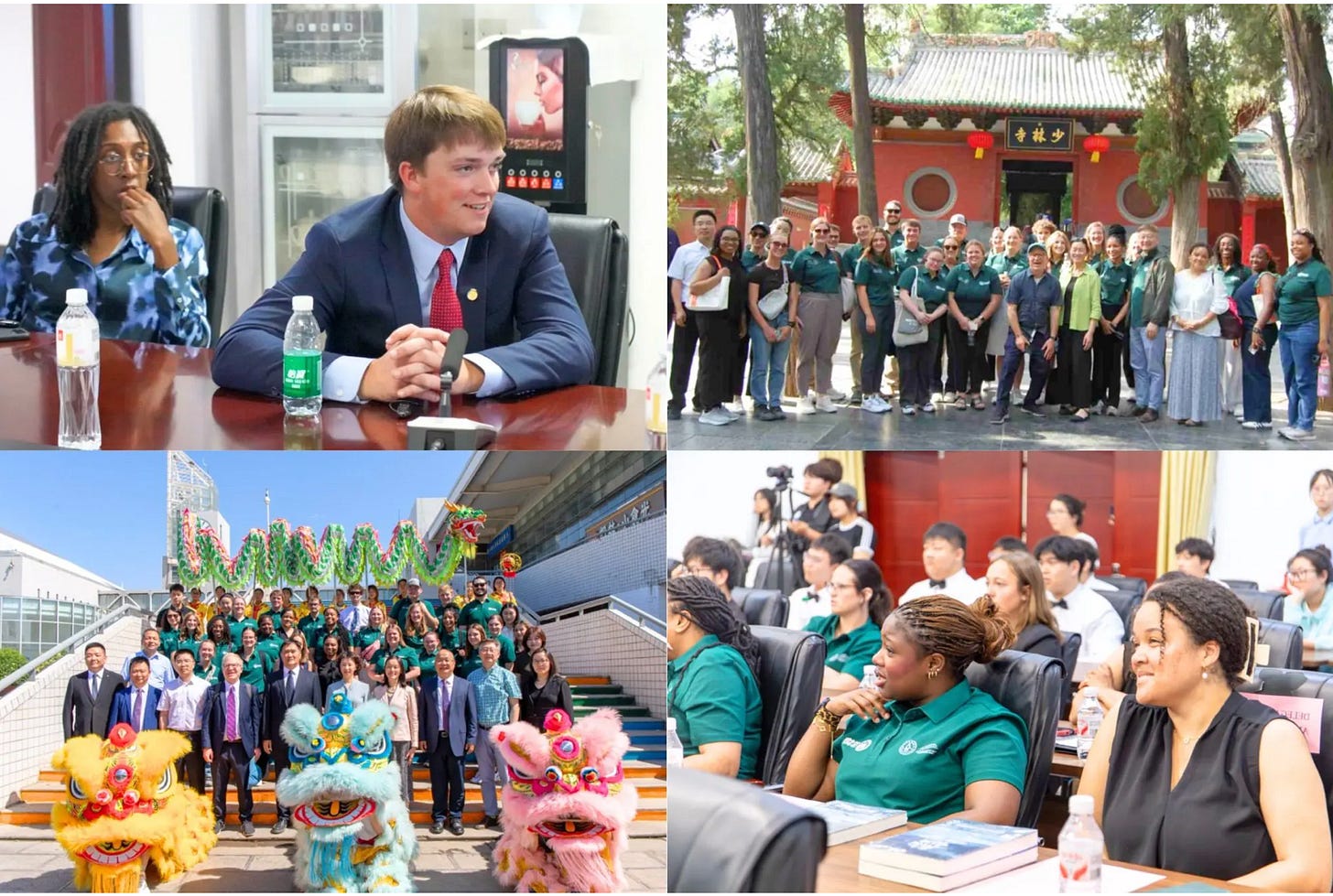 Delegation photos.
Delegation photos.The delegation was funded by “the U.S. Soy community, state and local trade associations, select universities, and private donations from the Heartland community,” according to the USHCA.
The delegation also counted participation from high-level American government officials during a briefing hosted by AmCham China with U.S. Department of Agriculture experts including the Animal and Plant Health Inspection Service, Food Safety and Inspection Services, Foreign Agricultural Service (FAS) from the U.S. Embassy in Beijing. Industry groups such as the U.S. Soybean Export Council, U.S. Grains Council, U.S. Meat Export Federation, USA Poultry and Egg Export Council were also in attendance.
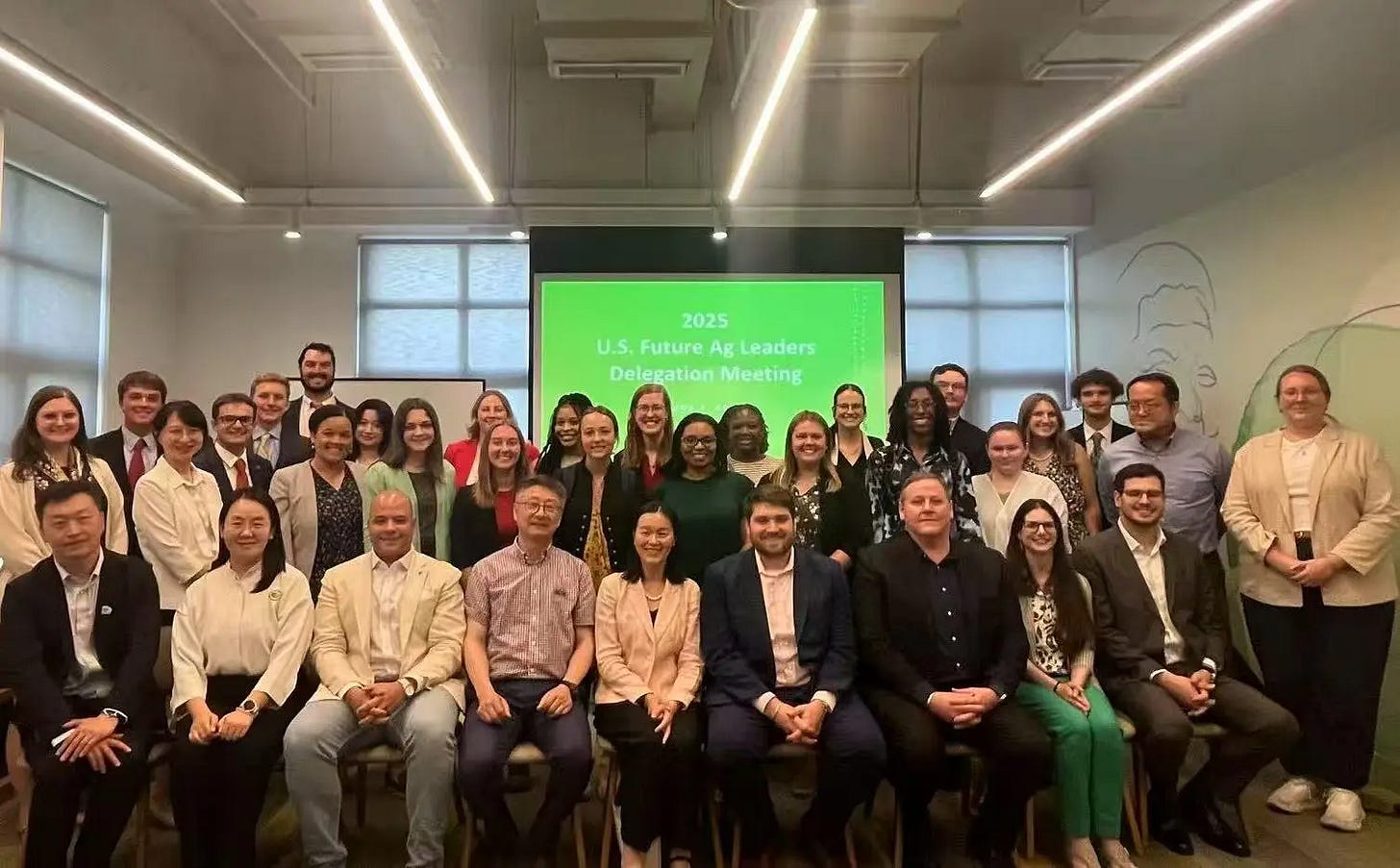 Delegation meeting with U.S. government officials.
Delegation meeting with U.S. government officials.The official spin on this delegation is a far cry from the truth.
“Build bridges and foster understanding between young Americans and Chinese agribusiness leaders.”
But the real goal?
Turn these impressionable kids into future diplomats, farmers, and policymakers who see China as a partner, not a threat. And as they return home, their stories will echo Beijing’s long-term strategy: buy, influence, and control.
Fellow United Front Work Department group CUSEF has used similar tactics on American university students and aspiring journalists.
One testimonial from a participating student in June 2017 asserted that the “culture and history of China far exceeds those of the United States” and said the trip would help them “spread the positive light of an amazing communist country”:
“I learned that the culture and history of China far exceeds those of the United States – exceeds it so well, it’s predicted that China will be the #1 country of foreign policy and investments in less than 20 years. Open your eyes and your mind, research for yourself and don’t be corrupted by the misinterpretation the classrooms feed us.
God knew that I needed to participate in this program. He saw me fit to be one of the 20 students that will help spread the positive light of an amazing communist country as well as help bridge that gap between the China-US cultural exchanges.”
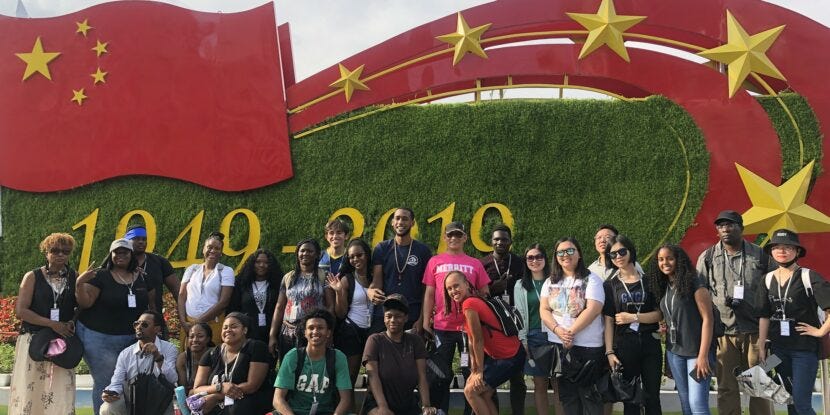 CUSEF student delegation to China.
CUSEF student delegation to China.The Pitch to Our Farmers (It’s an Inside Job)
I got my hands on an exclusive presentation from USCHA that reveals what Beijing’s soft-power sales pitch really sounds like. It’s all about “mutual benefits,” but behind the veneer of “collaboration,” it’s a blueprint for Chinese domination.
You can read the presentation here:
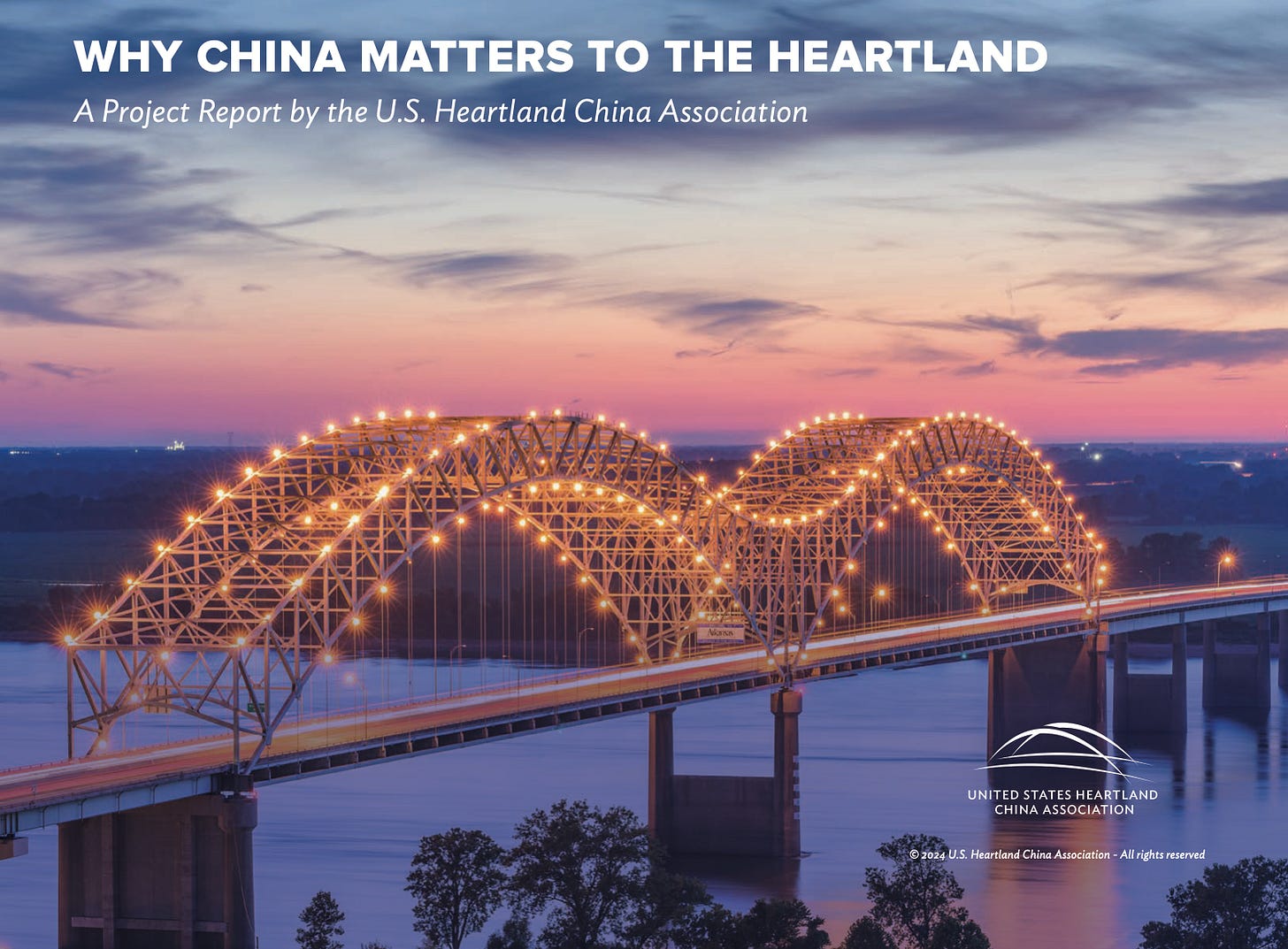 Presentation cover.
Presentation cover.Selected slides read:
“Partnering with Chinese agriculture accelerates innovation.”
“Access to Chinese markets helps U.S. farmers stay competitive.”
“Together, we’ll build a resilient, global agricultural industry.”
Sounds good? It’s supposed to. But buried beneath is a clear message: Beijing wants more control, more land, and more influence.
Their internal pitch deck is a roadmap for soft diplomacy—making it easier for Beijing to embed itself into America’s farms and influence local politics. It’s a behind-the-scenes playbook designed to facilitate China’s long-term infiltration.
The report acknowledges growing skepticism towards the CCP’s involvement in the heartland and explicitly admits to attempting to counter this narrative. It celebrates cultural exchanges like “two Republican senators from Louisiana joined the bipartisan delegation to China led by Senator Chuck Schumer” and notes the expanding presence of Chinese students in heartland classrooms.
In 2023, for example, Tennesee and Kentucky experienced a 27% and 54% increase in Chinese student enrollment, respectively.
Each heartland state has a curated slide explaining why China “matters” to it as seen below:
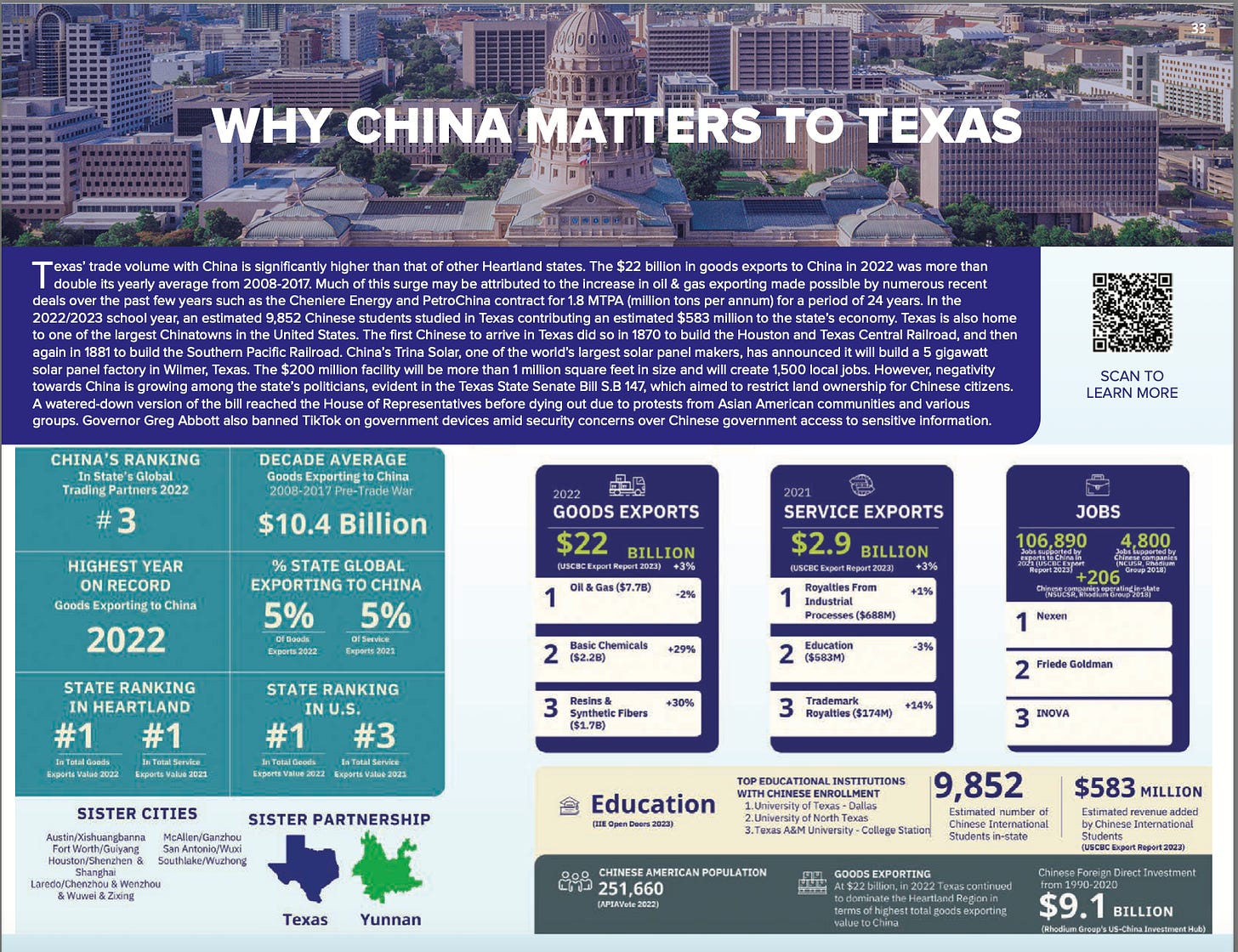
China’s Influence Operations in Media: How Western Voices Are Being Co-Opted
Beyond land deals and youth delegations, Beijing’s influence campaign targets the very narratives Americans consume every day. China’s strategy is clear. It seeks to infiltrate, co-opt, and soften the perception of Beijing’s long-term ambitions—especially in local media and among trusted Western voices.
Over the years, CUSEF has paid for Western journalists, academics, and influencers to visit China on “free” trips. These junkets—often framed as “fact-finding missions” or “cultural exchanges”—are part of Beijing’s systematic effort to buy favor and promote a propaganda-friendly narrative. When these visitors return home, they frequently publish stories that downplay China’s true intentions and portray Beijing’s global ambitions as benign or even beneficial.
This influence extends deeply into the farm and agricultural space.
For example, Greg Frazier—a man with a resume that includes serving in high-level positions at the USDA and the Office of the United States Trade Representative—recently published an op-ed in the Kansas City Star titled “Tone down the fearmongering about China’s supposed threat to Kansas farms.”
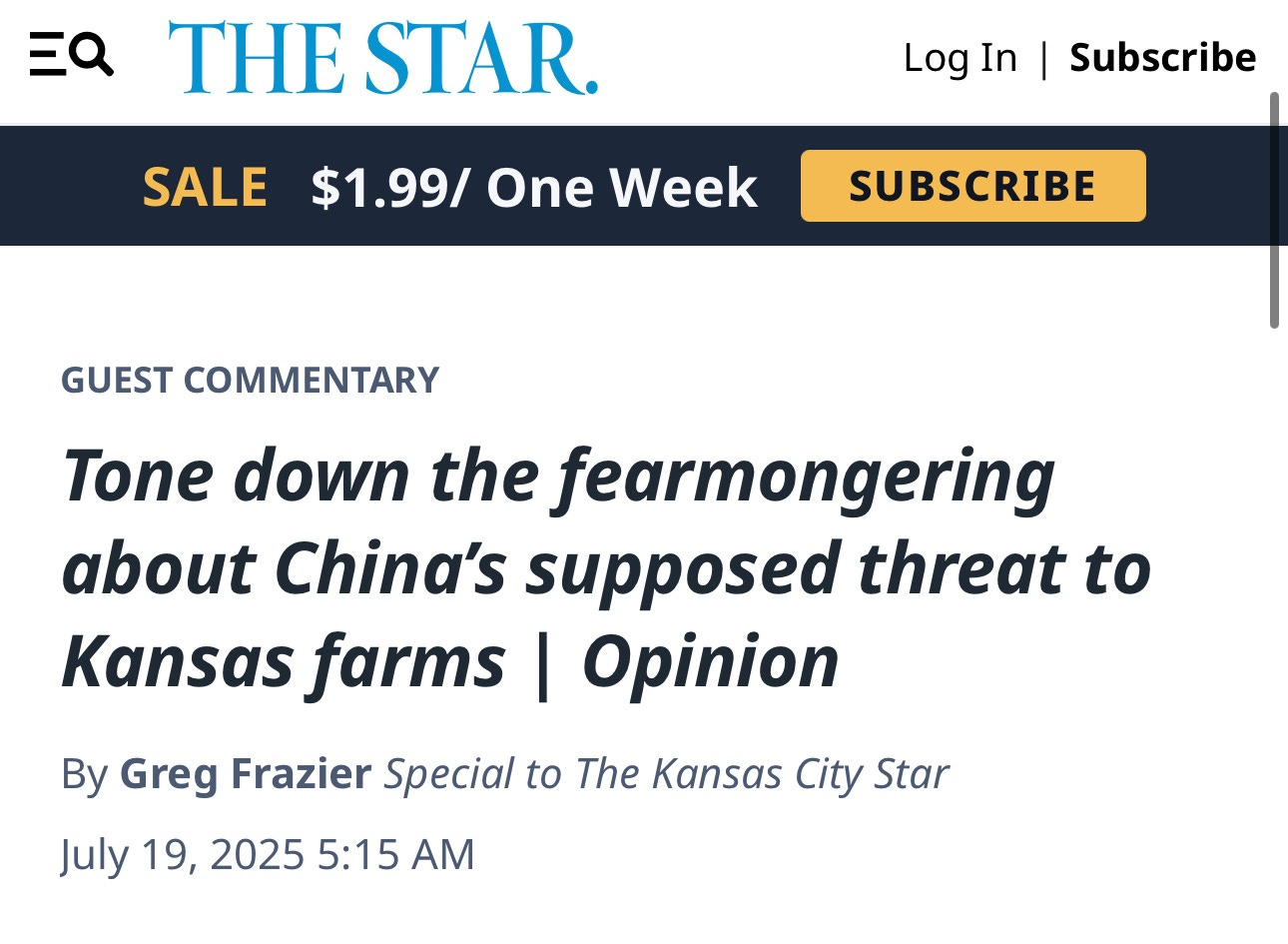
Frazier also served on the House Intelligence Committee before working in China, noting in his professional bio:
“He has extensive experience dealing with the Chinese government. He served as executive vice president for the Motion Picture Association from 2004 to 2013 and oversaw its foreign affairs, including the office in Beijing.”
The article demonstrate a classic soft-on-China worldview. He claims that:
“China is not a threat but an opportunity for America.”
“Engagement, not confrontation, is the way forward in our relationship with China.”
“Fear-mongering about China only serves to divide Americans and weaken our global standing.”
Frazier’s extensive background—serving in top U.S. government agencies and overseeing Hollywood’s dealings with Beijing—gives him credibility. However, that credibility appears to be weaponized to help China shift the narrative. His positions effectively serve as a form of soft diplomacy, aiming to make Americans more comfortable with Beijing’s ongoing expansion and influence campaigns.
The Enemy Within (and Abroad.)
The truth is crystal clear: China’s relentless rise to global dominance would be impossible without the willing betrayal of certain Western elites. These traitors have turned a blind eye or actively paved the way for Beijing’s expansion into American land, markets, and minds.
They’ve sold out our sovereignty for personal gain, all while our nation’s future hangs in the balance.
Subscribe for more scoops and behind-the-scenes content. Your support helps keep the fight going!